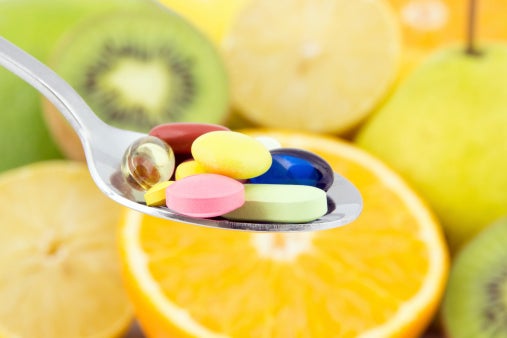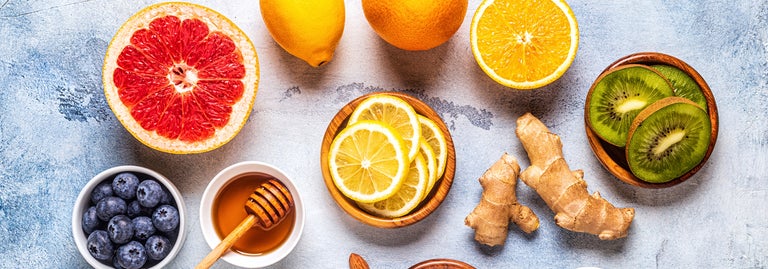1. Citrus fruits
Get your fill of oranges, mandarins, lemons and any other citrus fruits available in spring. Vitamin C is found in excess in citrus fruits. We all know it helps fight colds and flu, and aids in reducing their duration. But vitamin C also produces collagen in your body, which strengthens your blood vessels and muscles. Essentially, vitamin C is key in building a well-functioning immune system.
2. Spinach
Spinach is the king of immune-boosting veggies. The leafy plant helps to boost health by adding zinc to the immune system. Zinc aids in faster healing and cell regrowth. It also helps to break down carbohydrates in the body. Spinach is also loaded with vitamin C. Broccoli is a great option, too, and cooking it can enhance the vitamin A it contains.
3. Turmeric
Curcumin is the natural compound in turmeric responsible for its vibrant orange colour. It’s also a potent anti-inflammatory compound. Curcumin is known to boost immune cell activity and enhance antibody responses. You can sprinkle a turmeric-black pepper mix onto soups or cooked veggies, or use turmeric in your tea and smoothies.

4. Nuts
A handful of nuts packs a decent punch against fighting off illnesses. Different nuts contain zinc, healthy fats, and selenium, a mineral that helps boost the immune system. Brazil nuts have the highest amounts of selenium.
5. Mushrooms
The humble but powerful mushroom has been sustaining humans since ancient times. Mushrooms can support healthy immune response, lower inflammation and, through interaction with gut microbiota, improve immune cell functionality. Add them to curries, soups, breakfast egg scrambles, pastas, and you’ll reap the benefits.
6. Garlic
Garlic is an easy addition to plenty of meals. The pungent bulb contains sulphur, and is a great immunity booster. Introducing garlic into your diet can help reduce the severity of colds.
7. Sweet potato and carrots
These veggies are great sources of beta carotene, a nutrient that helps the immune system by aiding the production of white blood cells, which fight bacteria and viruses.
The nutrient also helps form the mucous membranes that line the respiratory tract, which acts as a protective barrier to keep germs out of the body.
One baked kumara or a cup of raw carrots packs over 100% of the daily vitamin A goal. Topping a baked kumara with nuts or seeds, or snacking on carrots with hummus or tahini, is an easy and tasty way to get a nutrient boost.
8. Greek yoghurt
Greek yoghurt is a great addition to any diet. Its probiotics help fight against cold and flu, and cleanses bacteria from your body. Yoghurt is a good source of vitamin D, which promotes immune health and improves the body’s natural defence system. Try to choose plain yoghurt instead of flavoured brands that contain a lot of sugar. Instead, sweeten it naturally with a little honey.
9. Blueberries
Blueberries have been dubbed the super berry for their amazing antioxidant properties. By snacking on a handful of blueberries, you’ll add anthocyanins into your system, which have been shown to have anti-inflammatory and anti-bacterial activity.
Fresh blueberries start hitting the shops in November and are available throughout summer and into autumn. Out of season, use frozen berries instead. Add them to your morning cereal or smoothie for a flavour and nutrient hit!
What about multivitamins, how can I get the most out of them?
Multivitamins are a great way to supplement a diet, and to ensure you’re getting the right nutrients. As part of the research for our 2020 award for Most Satisfied Customers | Multivitamins, we asked Kiwis about their vitamin use.
As well as discovering that Berocca is the nation’s favourite multivitamin brand, we found that most Kiwis (53%) take multivitamins as part of a healthy lifestyle. Also, most (42%) feel better when taking them regularly. But if you take multivits, how do you make the most of them?
Take multivitamins with meals:
When it comes to the timing of your daily vitamins, the best time to take them is with or after a meal. Taking vitamins with food makes it easier for your body to digest them, as it occurs alongside the naturally occurring nutrients in your food.
Take them with the right foods:
Vitamins are divided into fat-soluble vitamins, such as vitamins A, D and E, and water-soluble ones, including vitamin C and the B complex vitamins.
As their name suggests, fat-soluble vitamins are stored in the body’s fatty tissue, and are best digested alongside a source of fat. This can be anything from meat or fish, to nuts and dairy.
Water-soluble vitamins can’t be stored by the body and need to be replaced regularly through your diet. You don’t need to take them alongside any particular nutrients, but it’s a good idea to take them with breakfast, so they benefit you throughout the day.
Which are the best multivitamins for me?
With so many multivitamins available, trying to find the one for you can be a daunting and time-consuming task, so that’s why Canstar Blue has done the hard work for you.
Our latest multivitamin award is an insight into which multivits Kiwi consumers prefer and why. To read the full results and to discover why Berocca took out our award for Most Satisfied Consumers, just click on the button below:
Enjoy reading this article?
You can like us on Facebook and get social, or sign up to receive more news like this straight to your inbox.
By subscribing you agree to the Canstar Privacy Policy




Share this article